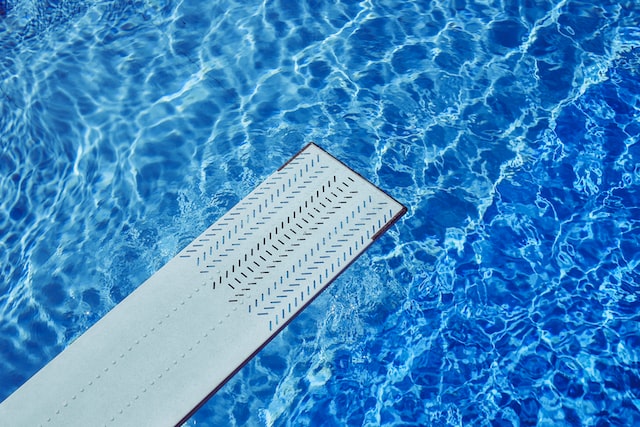Ben's Pool Care Guide: Making Your Chlorine Stick!

|
|
Photo by
Markus Spiske
on
Unsplash |
Ben's Pool Care Guide: Making Your Chlorine Stick!
Pools sound like a wonderful idea but can easily turn into a nightmare! It can get costly, time consuming, and even dangerous. In some cases it can take as much time and maintenance as a pet or child. Thankfully, through experience, heart ache, blood and tears, I have figured out how to tame the swimming pool beast!Welcome to my pool care series where I'll take you through some tips, tricks, and overall guidance to get your swimming pool in beautifully clean condition. These guides are going to be brief and made for "easy swimming" 😉.
Disclaimer: These series of guides are 100% suggestions and opinions. I am not a professional however, I am sharing what really works for me. If this guide does not relate to your current pool setup, please consult with your pool professional prior to attempting these tips.
NOTE: Always, ALWAYS, use rubber gloves, clothes you don't care about, a face mask and eye protection before handling any pool chemicals. Preparation is key for applying chlorine to your pool. Depending on pool size, you may need to repeat these steps a few times
Let's get to it! Today's topic is what everyone thinks is essential and is the biggest headache when it comes to balance: CHLORINE! The dreaded, burn your eyes and flesh chemical guaranteed to murder microbes in your swimming hole! Sadly, it gets expensive and frustrating so, let's dive deep to save you money and sanitize your pool safely!
Why sanitize the pool?

|
| Photo by Afshana Nasser on Unsplash |
The problem with chlorine!
It won't stick! As in, it sometimes feels the minute you put it in the pool is the minute it completely disappears! The reason your chlorine often won't stay in the water long depends on time of day and what steps are followed after that!
The sad truth, the sun is your enemy!

|
| Photo by Rafael Garcin on Unsplash |
Chlorine won't stay in the water because the sun eats it all up! The ultraviolet rays of the sun will break down almost all of your chlorine in a matter of hours. On especially hot days, it will diminish even faster! Let's get into how to resolve this issue.
Step One, prepare your chlorine
1. Put on your protections
2. Prepare a 5 gallon bucket of water. I usually fill it to 50% or 75% depending on how strong you are.
3. Pour in the suggested amount of chlorine using a measuring cup for the smallest recommended amount (my bottle says 10,000 gallons).
4. Stir the mixture for about 15 to 30 seconds or until fully dissolved
5. Repeat these steps for bigger pools
NOTE: It is necessary to dilute/dissolve the chlorine in water prior to adding it to your pool. This is because it can damage the walls/lining, not dissolve properly in the pool and just make a mess, and doesn't evenly distribute.
Step two, making the chlorine stick

|
| Photo by Ludvig Larsson on Unsplash |
Night Pour: Just like our little ones, chlorine doesn't do well with mid-day naps and is best put to bed at night. In other words, pour your mixture in your pool at night. The reason being, as stated previously, is that the sun light will destroy all your chlorine. Pouring at night or closer to the evening will allow the chlorine to destroy anything harmful in your pool for a full 8 or more hours.
Add some cynanuric acid: Cynanuric, also known as chlorine stabilizer or pool conditioner) is what I'd say is a requirement. This helps keep your chlorine in the pool while the sun is out and makes it "burn off" a lot slower. Don't forget to dilute first!
NOTE: Never mix any 2+ chemicals together at the same time. All chemicals mentioned need to be added and poured separately at separate times!
A simpler solution: Buy a pool cover. If you don't use your pool often this will save you money and keep your pool sanitized. You are going to need to look for a cover preferably that mentions it has UV protection. Using a cover often right after pouring your chlorine will keep the chlorine in the pool and protected from the sun. Ultimately, this is a great solution to avoid adding cynanuric acid, you save money, and you have less harmful chemicals in your water
Simplest solution: Get yourself a pool ionizer. While it does not keep the chlorine in the pool, it allows you to use less chlorine. With the pool ionizer you really just need to shock your water with chlorine dependent on use. It also saves a lot of money and reduces the need for harmful chemicals by a lot! For more information please visit my previous post, Ben's Pool Care Guide: Less Chlorine, More Ionization!
Overall
Following these steps should save you money and the use of a large amount of chemicals as it has for me! The aim of the game is to not need so many chemicals in your pool but, at the same time protecting your chlorine from diminishing, your water from being filthy, and keeping your swimmers healthy. Stay tuned for my next blog post: Ben's Pool Care Guide: This Vacuum Sucks!


.jpg)

Comments
Post a Comment